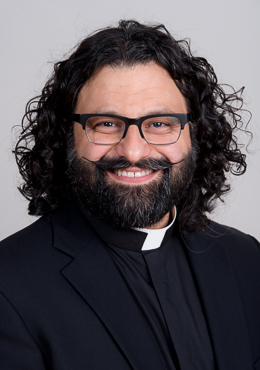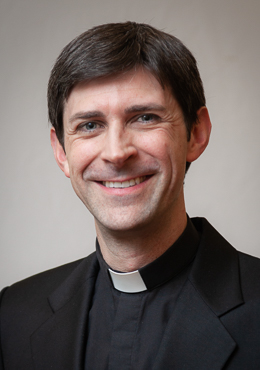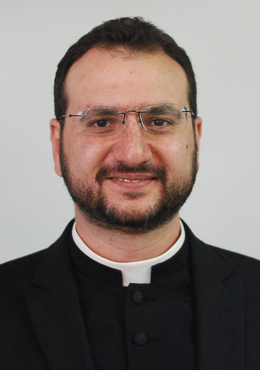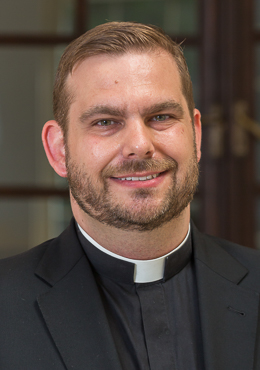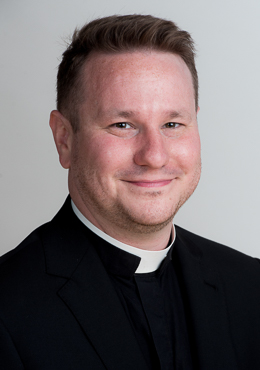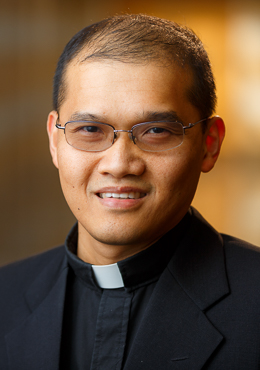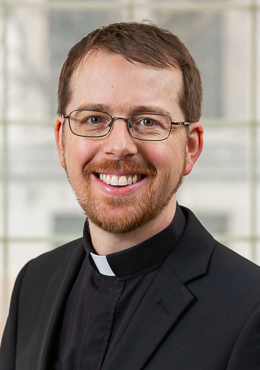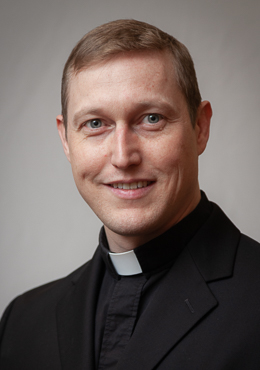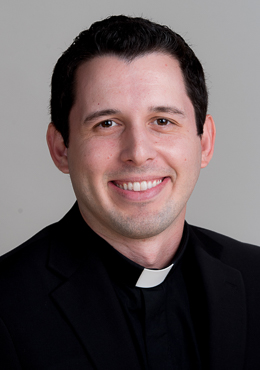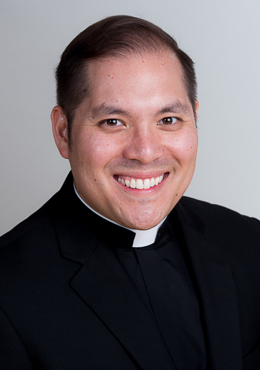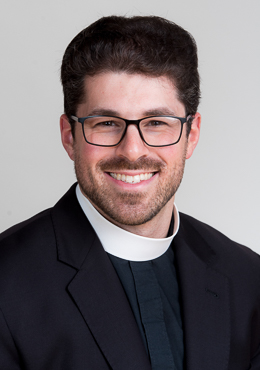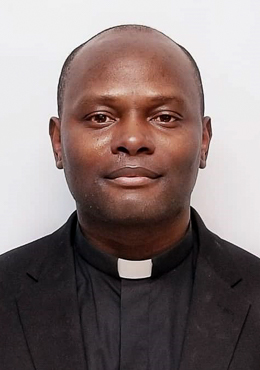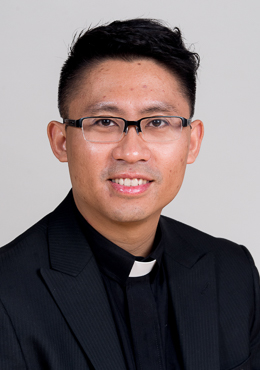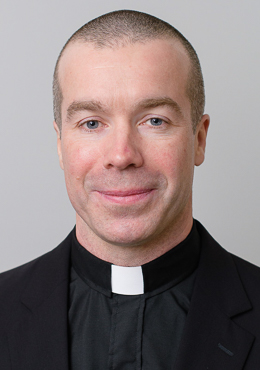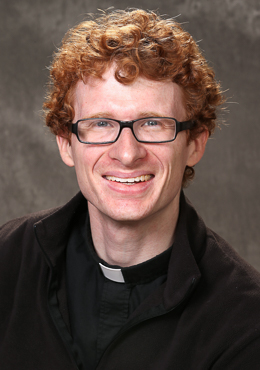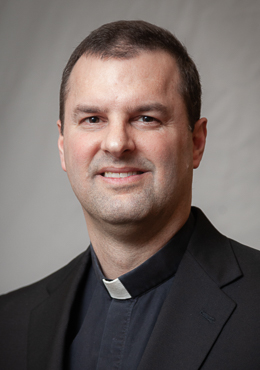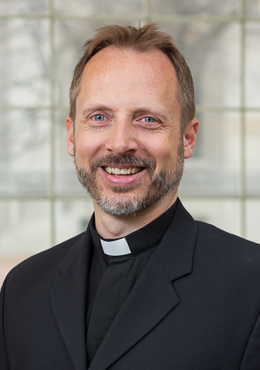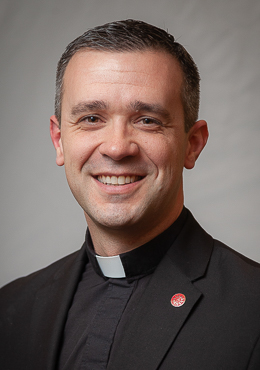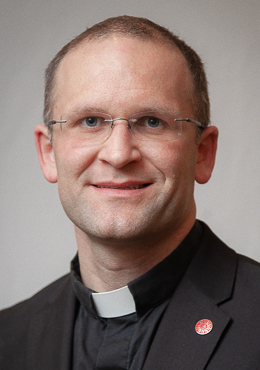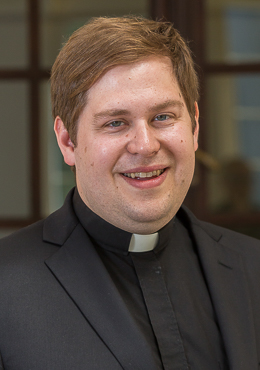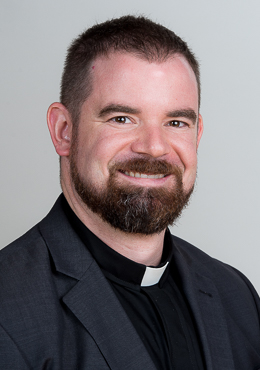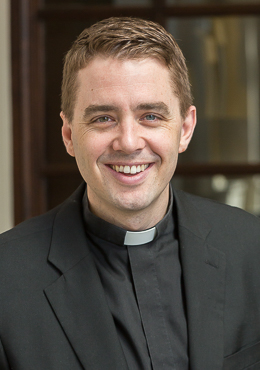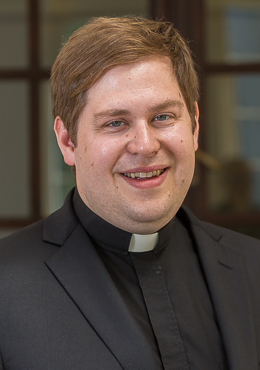
Province: USA Midwest
Birthday: November 21, 1984
Hometown: Cincinnati, Ohio
Education:
Bachelor’s degree, history, Miami University (Oxford, Ohio)
Bachelor’s degree, education, Miami University
Bachelor’s degree, classics, Miami University
Master’s degree, philosophical resources,
Fordham University
Master of Divinity, Regis
College, University of Toronto
Bachelor of Sacred Theology, Regis College, University of Toronto
Highlights of Jesuit Formation:
Worked as a chaplain at St. Barnabas Hospital and a volunteer gardener
at Central Park in New York City
Taught Latin and history at University of Detroit High School and
Academy
Supported Jesuit Volunteer communities in Detroit and Toronto
Post-Ordination:
Will teach
at St. John’s Jesuit High School in Toledo, Ohio
Biography:
James R. Sand, SJ, was born and raised in Cincinnati, Ohio. His
family was active at Our Mother of Sorrows Catholic Church, where James
attended grammar school and served on the altar. He met the Jesuits during his
studies at St. Xavier High School. It was his time there that taught him the
connections between spirituality and the lived life. He attended Miami
University in Oxford, Ohio, where he graduated with bachelor’s degrees in
history, education and classics. James then volunteered at St. Cecilia’s grade
school in St. Louis, Missouri, with the Jesuit Volunteer Corps. He entered the
Society of Jesus at the novitiate in Berkley, Michigan. After two years he took
first vows at the University of Detroit High School and Academy chapel in
Detroit, Michigan. He was then sent to Fordham University in the Bronx, New
York, where he earned a Master of Philosophical Resources. During his time in
New York City, James worked as a chaplain at St. Barnabas Hospital and a
volunteer gardener at Central Park. He was then sent to teach Latin and history
at the University of Detroit High School and Academy. While in Detroit he also
served as a support person for the local Jesuit Volunteer community. James was
then sent to study at Regis College at the University of Toronto in Canada.
During his time there he continued to play the role of a support person for a
community in Jesuit Volunteers Canada and earned a Master of Divinity degree.
He was ordained to the diaconate at St. Paul’s Basilica in Toronto, Ontario,
and served as a deacon at St. Basil’s Catholic Church at St. Michael’s College.
Following ordination to the priesthood, James will teach high school. (USA Midwest Province)
Who’s your favorite saint, and why?
My favorite
saint is St. Joseph. My father always expressed an affection for him when I was
growing up, and I think some of that affection has rubbed off on me. My father
said that he was a saint who “worked with his hands for a living.” Joseph was a
man who had to struggle with the demands of everyday life as a carpenter while
also living up to the tasks God gave him. Joseph strikes me as a quiet man who
got caught up in all sorts of strange and wonderful things.
His simple and honest goodness and attempts to do what is right, even in the midst and against his own hesitancies, is a compelling, imperfect human element in the middle of a story about angelic hosts, the stainless Virgin and God’s descending to earth in the flesh. Joseph is just going about his life and trying his best. God sends dreams to motivate and aid him in making the proper decisions, but it is not the divine dreams that mark out Joseph as holy. Rather, it is the struggle with the circumstances of his abnormal life that highlight the virtue of his profound love for his wife, child and God. He hesitates not because he is fearful or desires evil but because he wants to do the best and does not always know what would actually be best. He comes across as unsure exactly because he is such a good man. Yet when he knows the good, he does not hesitate but makes every sacrifice for it.

James (second from right) with his family and Superior General Fr. Arturo Sosa, SJ (far right), at his diaconate ordination.
What is your favorite book, movie, music, or TV show you’ve encountered
since entering the Society and why do you love it?
Since joining the Society of Jesus,
Mozart’s “Die Zauberflöte” (“The Magic Flute”) has become my favorite piece of
music. The whole operatic genre has substantially grown in importance to me
since becoming a Jesuit. I had only seen two operas prior to joining the
Society, both of which were good, but I never followed up with them. Moving to
New York City to study philosophy provided me with the opportunity to attend
the Metropolitan Opera on a regular basis, and perhaps just as importantly in
promoting the increased importance of opera in my life was that the study of
philosophy made me see music — and beauty in general — in a new and more
meaningful way.
No matter how I am feeling at that particular moment of life Die Zauberflöte’s simple, catchy tunes, comic characters and situations, and general moral goodness makes me feel happier. What’s more, it also reminds and teaches me to be a better man. Its fanciful setting allows me to travel to a faraway world and in so doing actually gives me the space to listen to its lessons. Its simple message that a life guided by the virtues of steadfastness, patience and silence during times of trial, both fearful and seemingly pleasant, leads to beauty and goodness has always spoken to me in the midst of the ups and downs of Jesuit formation. It reminds me that God calls each person to live a good and noble life in the midst of the varied circumstances given to him.
The lessons of this piece cut through so much of the noise of my life to remind me of what should already be known. Those things that are most important are worth and indeed require sacrifice. Die Zauberflöte’s ability to show the connections between trial and affection, solitude and community, sacrifice and love means it always has something to offer me. Die Zauberflöte is both a comfort and a goad, it is good for all seasons.

"The Magic Flute" at the Michigan Opera Theatre (Wikimedia Commons)
What was one particularly meaningful experience you had during your
formation, and why was it meaningful to you?
The most meaningful experience during
my time in the Jesuits was not a singular event but was the process of learning
philosophy. I began my philosophy studies, like many Jesuits, thinking that it
was the most useless of all the things that the Society had in store for me. My
first year of studying philosophy was the worst year of my life thus far. The
first year had proven all of my fears well founded. The study of philosophy was
just something to be suffered through in hope of better times.
I felt so out of my element and in over my head both in and out of class. This undoubtedly was partly due to my being a quiet Ohioan suddenly living in the lights and noise of New York City. Everything was foreign and taxing for me. Yet, I persevered, likely with more help than I know from others, and it proved to be a life-changing time for me. While there was much that changed in my life outside the classroom, my experience of a few wonderful teachers proved to be the deciding factor, foremost among them: Frs. Chris Cullen, SJ; Tom Krettek, SJ; and Joe Koterski, SJ. Each man taught me the extreme value of philosophy as a way of life. I came to fall in love with the philosophy of the ancients and the medievals and see the value each has in a life lived today. Each of these professors in their own particular way gave me an experience of loving truth and a vision of the holiness that shone through such a life. I treasure the three years I spent learning philosophy, even the first year of pain and fear.
Who is one important mentor who has accompanied you on your journey?
What made them a good mentor?
As soon as someone mentions the term
mentor my mind immediately goes to Mr. John Feeney, a longtime foreign language
teacher at University of Detroit Jesuit High. He was officially my “mentor
teacher” in my first year of regency, teaching the high schoolers, but beyond
that official title, I think of John Feeney as a mentor in and out of the
classroom.
John taught me much about the classroom. He is clearly an expert teacher who both inspires the students to be better young men and also both learn and see the beauty in learning their declensions and conjugations. John also knows that every teacher is a different person and must teach differently. Any skill I have as a teacher I attribute to John’s willingness to simply allow me to teach from the earliest possible moment and allow me to be my own teacher.
John is not only a mentor inside the classroom but is also a model of what a good man is in general. He is one of the most intelligent and talented men I have ever met. He is a man who loves his family and his friends. He is a man who cares about what matters most and shows a true joy in the things of beauty and nobility in life. Yet, perhaps more rarely, he is also a man who loves the noble and also knows that life is complicated and never as easy as it seems it should be in theory.
